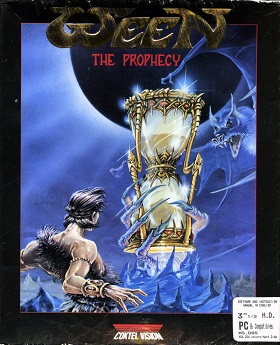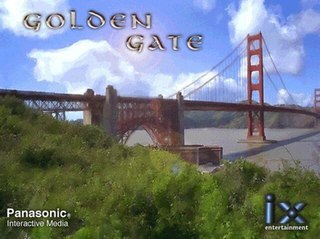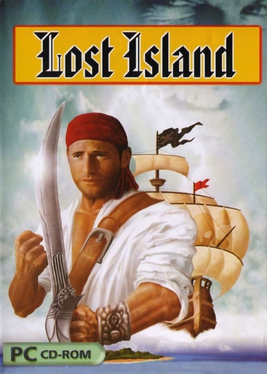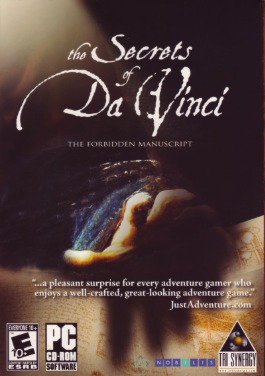
Atlantis: The Lost Tales is a 1997 fantasy adventure video game developed and published by Cryo Interactive Entertainment. Interplay Productions published the game in North America, where it released on September 30, 1997. The game is named after its initial and most important setting, Atlantis. It is the first in a Myst-like series, and was followed by Atlantis II, Atlantis III: The New World, Atlantis Evolution and The Secrets of Atlantis: The Sacred Legacy.

Atlantis III: The New World,, is a 2001 fantasy adventure video game developed and published by Cryo Interactive, with Dreamcatcher Interactive publishing the game in North America. David Rhodes composed the musical score. It is the third game in the Atlantis series by Cryo, as well as the last one made before Cryo's closure. It was followed by Atlantis Evolution in 2004.

Crusader: Adventure Out of Time, also known as Crusader: A Conspiracy in the Kingdom of Jerusalem is a 1997 video game, developed by Index+ and published by Europress. The game was published for Windows, Windows 3.x and Mac OS.

Egypt III, known as The Egyptian Prophecy in North America, is a 2004 graphic adventure game developed by Kheops Studio and published by The Adventure Company. The player must solve an array of ancient riddles that will help a dying Pharaoh survive and restore Egypt to glory. The game is the third and final game in the Egypt trilogy, following Egypt 1156 B.C. and Egypt II: The Heliopolis Prophecy. In 2010, Microïds released an adaptation of the game, split into parts, for the Apple iPhone.

Monty Python's The Meaning of Life is an adventure game created by 7th Level in 1997 for Windows. The game is based on the 1983 film of the same name and was the third of three Monty Python games created by 7th Level. It was rated Mature by the ESRB in North America.

Anastasia: Adventures with Pooka and Bartok is a Fox Interactive puzzle video game based on the 1997 animated film Anastasia. Released on November 25, 1997, it was produced by David Wisehart. Wisehart also served as voiceover director. The game had an estimated budget of US$800,000.

Synnergist is a point and click adventure for MS-DOS developed by Vicarious Visions and published by 21st Century Entertainment in 1996. It was Vicarious Visions' first video game. The game includes "digitized actors and full motion video." It was only released in Europe.

Chewy: Esc from F5 is a 1995 point-and-click adventure released for MS-DOS compatible operating systems in 1995. A Microsoft Windows version followed in 1997.

The Prophecy is a point-and-click adventure game in a fantasy setting, developed by Coktel Vision and MDO, released in Europe in 1992 for MS-DOS, Amiga, and Atari ST. It was published by Sierra On-Line in North America in 1993. A German retail version was released.

Byzantine: The Betrayal is a video game, released September 30, 1997 for Microsoft Windows.

Physicus: Save the World with Science! is a 1999 educational adventure video game developed by Ruske & Pühretmaier Edutainment and published by Heureka-Klett-Softwareverlag and Tivola Entertainment. It aims to teach players about physics concepts. It is part of a series that includes the chemistry-themed Chemicus and biology-themed sequel Bioscopia. It was the second learning adventure game by Ruske & Pühretmaier after the music-based Opera Fatal. The game's website had a minigame called "PHYSICO DriveIn" that players could download and complete in to get the highscore, which would win them a free copy of a game by the studio. A sequel entitled Physicus: The Return was later released, and was remade for the iOS.

Reah: Face the Unknown, known in North America as simply Reah, is a 1998 first-person puzzle-oriented adventure game with a non-linear plot, described as a Myst-clone. It was developed by Project Two Interactive / Black Friar and published by Detalion and LK Avalon. It was distributed by Erbe in Spain on October 10, 1998. It was published by Project 2 Interactive in the Netherlands, and distributed in the U.S. and Canada by GT Interactive in 1999.

Golden Gate is a 1997 adventure video game developed by iX Entertainment and published by Panasonic Interactive Media. A 3DO Interactive Multiplayer version was in development but never released.

The Arrival is a 1997 adventure game developed by Enteraktion and published by Live Interactive. It was released on Mac and Windows. It's an adaption of the film of the same name.

Missing on Lost Island is a 2000 Slovak adventure game developed by Mayhem Studios, and published by Bohemia Interactive.
Magnetic: The Game of Games is a 2003 video game developed by Australian studio Mulawa Dreaming. It was the second game by the studio after Xiama. The game had a players only forum on its web site. Magnetic Revisited was a redesigned and rewritten version released in 2010. The game would be followed by Magicama, and Cooroora.

The Secrets of Da Vinci: The Forbidden Manuscript is an adventure game developed by Kheops Studio and published by Tri Synergy on June 7, 2006 on the PC. In 2009 it was released on the Mac OS X.

Santa Fe Mysteries: The Elk Moon Murder is a video game, the first in the Santa Fe Mysteries series, followed by Santa Fe Mysteries: Sacred Ground. In The Elk Moon Murder, a famous Native American artist named Anna Elk Moon is murdered in the American Southwest.

U.F.O.s is a 1997 adventure video game developed by Artech Digital Entertainment and published by Corel Corporation and Hoffmann + Associates on Macintosh and Windows.


















